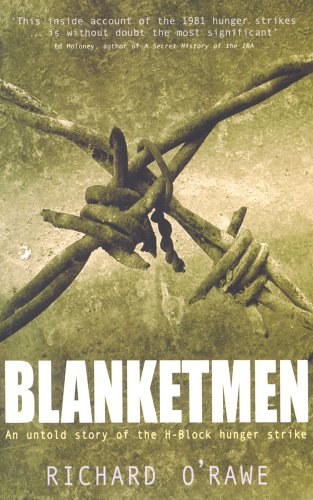May 18, 2005
Dolours Price: A Salute to Comrades

A Salute to Comrades
Book Review
Dolours Price, The Blanket • 18 May 2005
After reading ‘Ten Men Dead’ I swore that I would never again read about the Hunger Strike of 1981. I cried at every page and my husband eventually hid the book. I bought another.
My levels of sadness rose at the same rate as my levels of anger. The targets for my anger were the usual ones: those identified by the Republican Leadership as responsible for the death of Bobby Sands and his comrades. Top of the list was Margaret Thatcher, then came busybody priests, political opponents, an uncaring Free-State Government and more and more.
Hunger-striking, the last resort of the brutalised political prisoner. The ultimate weapon, one’s own body. As a Republican I have always maintained that just as I could not be ordered to undertake a Hunger-Strike, then the control and ultimate decision as to where that hunger-strike might lead was also a matter for myself, the individual prisoner. That is not to say that guidance from comrades and particularly the leadership of my movement would at all times be of paramount importance in where that Strike would end for me, be that living or dying.
I read Richard O’Rawe’s book ‘Blanketmen’ because I felt the years that have passed since the Hunger-Strike would let me better cope with the enormity of the sacrifices made then. I was also curious to hear how it was from the ‘inside’.
Living in the Republican community in 1981, having just left prison myself weeks before Bobby Sands died, I took in every word uttered by the then (and still) Republican leadership. They were all out to kill our boys, the Thatcher’s, the civil servants, the media, the lot of them, and those who weren’t out to kill our boys were out to break the Hunger-strike. We were all angry then and we believed and trusted our leadership to act in the best interest of our Comrades. We trusted them and so did the Hunger-strikers.
Richard O’Rawe raises some very disturbing questions in his account of what was happening inside the prison during this period. How exactly was the Hunger-strike being conducted, particularly after the death of the first four men? He clearly says that decisions come to by the prisoners’ command staff and with the knowledge and agreement of the Strikers themselves would mysteriously change after visits by the representatives of Sinn Fein.
If Richard O’Rawe has accurately recorded the events of the time, and there is no reason to suggest he hasn’t, then questions we all quietly asked ourselves way back in 1981 —why so many, where will it end, how can it end— are all too clearly answered for us. There were no orders forthcoming, no orders could be forthcoming.
As I have already stated this was a matter for the prisoners, the Strikers, but, and this is an enormous BUT, no-one in the leadership of the Republican Movement advised the men that it was time, that enough was available to build on, that their deaths were more than the movement could endure. No such comradely concern was shown to very ill and vulnerable friends. No humanity, just political tactics, tactics which we have seen seep through the Republican community in the years since like the Black Death: everything is justifiable if it advances the Sinn Fein agenda.
Was there a motive in what seemed like madness by the leadership? Richard O’Rawe points clearly to a very unpalatable one for Republicans to accept. Yes, men were sacrificed for the political ambitions of the Republican leadership. They trusted and they died. We should all be indebted to Richard O’Rawe for having the courage to put pen to paper and declare that to the world.
I find his memoir of that period both deeply moving and credible. Without being melodramatic, I will say that, allowing for the times we live in, Richard has probably made stronger enemies than he has friends and it is a credit to him that this consideration has not prevented the rest of us having access to this vital piece in the jigsaw, a very sad piece, a sad and dirty period in our history. I applaud Richard for his loyalty to our dead comrades who cannot speak for themselves. This book has been written with genuine heart, it has been researched thoroughly and put together with intelligence and consideration. It is a captivating read, written by a skilled writer.
This is one man’s account. There are hundreds more out there with stories to tell. I urge them to tell those stories. Yes, ‘history is written by the victors,’ but the truth is written by people of courage, people such as Richard O’Rawe. Salute.
 It has withstood the blows of a million years, and will do so to the end.
It has withstood the blows of a million years, and will do so to the end.